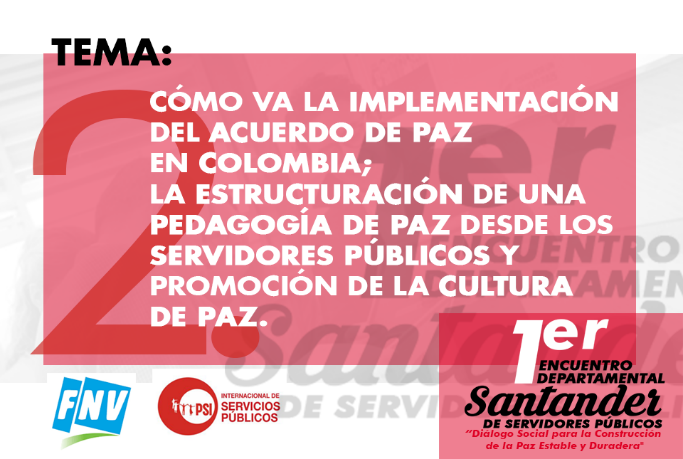- Tags (3)

David Boys
- Tags (3)
Social dialogue for the construction of a stable and lasting peace in the public sector
This project was established collectively by PSI affiliates in Colombia to promote the active participation of state workers' organizations and public services in the construction of a stable and lasting peace, a challenge that arose after the signing of the agreement to end the armed conflict between the FARC and the Colombian state.
Two specific objectives were set: the first was to implement the negotiation and enforcement of labour agreements in the public sector, through social dialogue at the territorial and national level, with emphasis on strengthening collective bargaining in the country's municipalities and departments. The second is to form a Peace Table, with the participation of public sector workers' unions, in order to contribute to the construction of a stable and lasting peace, involving in this process of dialogue both workers and the public authorities of the entities responsible for the promotion and application of human rights, as well as those responsible for compliance with the agreement for the end of the armed conflict.

To achieve these objectives, departmental meetings of public servants were planned in four regions of Colombia, systematizing the experiences in the negotiation processes, verifying the implementation of the agreement for an end to the armed conflict in each of the regions and establishing work plans that commit public sector trade unions and public servants to building peace. Likewise, a culture and peace education programme is being formulated with the aim of being applied in state entities, so that public servants understand the need to contribute to the construction of a stable and lasting peace and promote fundamental human rights. To this end, a team of peace negotiators has been created, led by PSI affiliates in Colombia. They will be responsible for implementing the programme in state institutions.
To develop these two general lines of work, the participation of PSI's national youth committee in Colombia is required as well as other workers who are discriminated against, such as LGBT+ and those who are discriminated against based on their race or ethnicity.
Today more than ever, when peacebuilding is threatened by multiple political and social factors in Colombia, the project takes on vital and determining importance for state and public service workers.